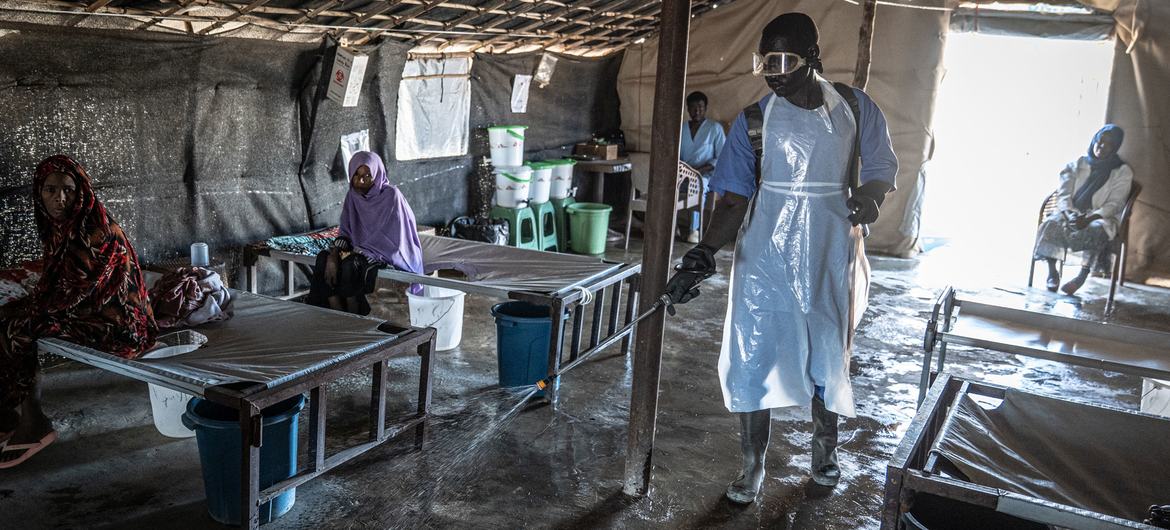
Sudan: Decomposing Cholera Victims’ Bodies and Fears of a New Wave in the Rainy Season
Sudan Media Forum
Khartoum, 28 June 2025 (Sudan Tribune) — Activists on social media are circulating images showing hundreds of decomposing bodies of people who had died from cholera, a disease now widespread across several regions of Sudan in recent months. Volunteers from Khartoum, Gezira State, and parts of Darfur have reported these scenes, which have also been confirmed by official sources in Khartoum State.
Concerns are growing with the arrival of Sudan’s rainy season. Doctors and health experts warn of a resurgence of the epidemic in many areas, including Khartoum, which is witnessing the slow return of displaced residents after two years of war.
Humanitarian volunteer Ahmed Farouk told Sudan Tribune that they recently buried several cholera victims in Omdurman, particularly in the city’s southern neighborhoods. Medical reports indicated that residents of southern Omdurman were drinking from a water station contaminated due to the ongoing conflict, leading to many infections and deaths.
A health surveillance report by the Ministry of Health showed that out of 1,412 water sources tested, 328 did not meet safety standards.
A source within the Khartoum State Ministry of Health, who requested anonymity, confirmed to Sudan Tribune that there are decomposing bodies of cholera victims in southern Omdurman. He added that health and security authorities have responded and that disinfection operations are underway in these areas, without specifying their locations.
Meanwhile, volunteer (L.M) reported that there are hundreds of corpses in East Darfur and in the western and southern regions, claiming that Rapid Support Forces (RSF) refuse to cooperate with volunteers and medical teams trying to contain the outbreak. She said the spread of these corpses, according to reports from numerous volunteers across the country, is terrifying local residents, noting the difficulty of accessing many areas, including some villages in Gezira State also hit by cholera.
Sudan Tribune could not independently verify the presence of these bodies in RSF-controlled areas due to challenges in communication after the RSF cut off satellite internet services in several areas or imposed restrictions on users.
Last month, Sudanese Health Minister Haitham Mohamed Ibrahim stated that weekly cholera cases ranged between 600 and 700, mostly in the capital Khartoum, with dozens of deaths.
The World Health Organization in Sudan has confirmed that 20 million people in Sudan need emergency health assistance and that 18 Sudanese states are facing a cholera outbreak. Dr. Chibel Sahbani, the WHO representative in Sudan, said in a mid-June press briefing:
“Sudan has been suffering from a cholera outbreak for two years, and now infection rates are rising. With the arrival of summer, we expect to see a new wave of cases.”
After the cholera spread in Omdurman two months ago, the Khartoum State Ministry of Health formed an emergency committee to monitor this crisis, which comes amid difficulties accessing water and electricity.
The same Health Ministry source said that ten cholera treatment centers have been established, most of them in Omdurman. He also noted that Bahri Teaching Hospital is about to resume services, providing — in his words — a good opportunity to contain and eliminate the disease. He warned of the coming rainy season, calling for urgent health plans, confirming that relevant authorities are on alert and have secured adequate supplies of medicines and equipment.
Medical sources told Sudan Tribune that cholera has spread across Khartoum, Gezira, Sennar, Kordofan, and Darfur states, stressing that although the current wave has receded somewhat, it is likely to surge again with the rainy season.
Areas such as Tawila and Jebel Marra are experiencing heavy rains these days, amid tragic conditions for displaced people there, according to a statement last week by the General Coordination for Displaced Persons and Refugees. Authorities have not disclosed the extent of the epidemic in these areas due to difficulty accessing them as a result of continued clashes between the army and RSF in the troubled region.
At the end of May, former Prime Minister Abdalla Hamdok, head of the Civil Democratic Forces (Samood) coalition, said he had contacted several regional and international health and humanitarian organizations to brief them on the disastrous health situation caused by the spread of cholera and other epidemics in Sudan.
At the end of last May, the Sudanese Ministry of Health expressed deep concern over the health conditions in several states as cholera infections rose, reporting 2,729 cases of the disease in a single week, including 172 deaths. Of these, 90% of the cases were in Khartoum State, particularly in Omdurman localities at the time.
--
The Sudan Media Forum and its member institutions are publishing this material, prepared by Sudan Tribune, to shed light on the humanitarian and health crisis ravaging various parts of Sudan’s states, especially conflict areas, where the collapse of health infrastructure and the lack and weakness of services have fueled the spread of diseases and epidemics, most notably cholera, which has infected thousands and claimed hundreds of lives.


